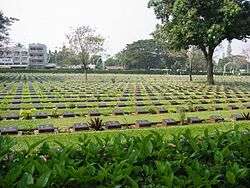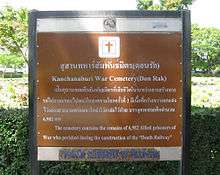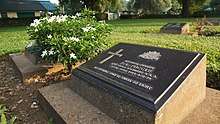Kanchanaburi War Cemetery
The Kanchanaburi War Cemetery (known locally as the Don-Rak War Cemetery) is the main prisoner of war (POW) cemetery for victims of Japanese imprisonment while building the Burma Railway. It is on the main road, Saeng Chuto Road, through the town of Kanchanaburi, Thailand, adjacent to an older Chinese cemetery.
 War graves cemetery | |
| Details | |
|---|---|
| Established | In its current form, February 1956 |
| Location | |
| Country | Thailand |
| Coordinates | 14°1′54″N 99°31′32″E |
| Type | Military Cemetery |
| Owned by | Commonwealth War Graves Commission |
| No. of graves | 6,982 |
| Website | Cemetery details. Commonwealth War Graves Commission. |
| Find a Grave | Kanchanaburi War Cemetery |


The cemetery was designed by Colin St Clair Oakes and is maintained by the Commonwealth War Graves Commission. There are 6,982 POWs buried there, mostly Australian, British, and Dutch. It contains the remains of prisoners buried beside the south section of the railway from Bangkok to Nieke, excepting those identified as Americans, whose remains were repatriated.
There are 1,896 Dutch war graves, the rest being from Britain and the Commonwealth. Two graves contain the ashes of 300 men who were cremated. The Kanchanaburi Memorial gives the names of 11 from India who are buried in Muslim cemeteries.
Nearby, across a side road, is the Thailand–Burma Railway Centre about the railway and the prisoners who built it. There is also a Dutch Roman Catholic church nearby – Beata Mundi Regina.
See also
- Thanbyuzayat War Cemetery in Burma (Myanmar)

- JEATH War Museum
- Thailand–Burma Railway Centre
References
- Cemetery details. Commonwealth War Graves Commission.
- Photographs from Kanchanaburi War Cemetery
- Getting to and from Kanchaburi
| Wikimedia Commons has media related to Kanchanaburi War Cemetery. |